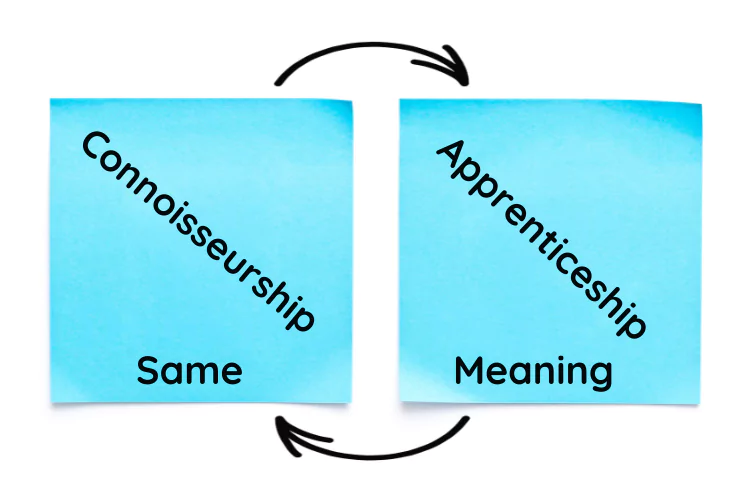When exploring the realms of expertise and professional development, many people wonder: are connoisseurship and apprenticeship the same meaning? While both terms relate to mastery and knowledge acquisition, they represent distinct concepts with unique characteristics and applications. Let’s delve deep into understanding these two important terms and their roles in professional and personal development.
Defining Connoisseurship: The Art of Appreciation
Connoisseurship represents a refined understanding and appreciation of a particular subject matter, typically in the arts, wine, food, or other cultural domains. A connoisseur possesses sophisticated taste and expert judgment in their field of interest, developed through extensive exposure and study. This expertise allows them to discern subtle qualities and characteristics that might escape the notice of casual observers.
Understanding Apprenticeship: Learning Through Practice
Apprenticeship, on the other hand, is a structured system of training where an individual learns a trade, craft, or profession under the guidance of an experienced practitioner. This hands-on approach to learning combines practical work experience with theoretical education, allowing apprentices to develop both technical skills and professional knowledge.
Key Distinctions Between Connoisseurship and Apprenticeship
Purpose and Focus
Connoisseurship primarily emphasizes appreciation and evaluation, while apprenticeship focuses on skill development and practical application. A connoisseur might be expert at judging fine wines, but may never have made wine themselves. Conversely, an apprentice winemaker learns the actual process of wine production, though they may not initially possess the refined palate of a wine connoisseur.
Learning Methods
- Traditional apprenticeship involves:
- Structured hands-on training
- Direct mentorship
- Progressive skill development
- Formal workplace learning
- Clear performance metrics
- Connoisseurship typically develops through:
- Personal study and research
- Extensive exposure to exemplary works
- Development of critical analysis skills
- Networking with other experts
- Continuous refinement of taste
Professional Applications and Career Paths
Understanding these distinct concepts helps individuals choose appropriate paths for their professional development. While apprenticeship often leads to specific career qualifications, connoisseurship might enhance one’s expertise in a current profession or serve as a foundation for careers in criticism, consulting, or collecting.
The Intersection of Connoisseurship and Apprenticeship
Despite their differences, these concepts can complement each other effectively. Many successful professionals combine both approaches, using apprenticeship to master technical skills while developing connoisseurship to refine their judgment and appreciation of their field.
Modern Applications in Different Industries
Today, both connoisseurship and apprenticeship have evolved to meet contemporary needs. Digital apprenticeships have emerged in technology sectors, while online communities and resources have made connoisseurship more accessible to enthusiasts in various fields.
The Role of Education and Experience
Both paths require dedication and time, but they differ in their educational approaches. Apprenticeship typically follows a structured curriculum with clear milestones, while connoisseurship often develops through self-directed learning and experience.
Impact on Personal Development
Whether pursuing connoisseurship or apprenticeship, individuals gain valuable personal and professional growth opportunities. Both paths can lead to expertise, though they approach it from different angles and with different end goals.
Future Trends and Evolution
As industries evolve, both connoisseurship and apprenticeship continue to adapt. Digital technologies, remote learning, and global connectivity are reshaping how these traditional forms of expertise development are acquired and applied.
Choosing the Right Path
When deciding between developing connoisseurship or pursuing an apprenticeship, consider your goals, learning style, and career aspirations. Some fields might benefit from combining both approaches, while others might require focusing on one path initially.
Conclusion
Are connoisseurship and apprenticeship the same meaning? The answer is clearly no. While both paths lead to expertise, they serve different purposes and employ different methods. Understanding these differences helps individuals make informed decisions about their professional development journey. Whether choosing connoisseurship, apprenticeship, or a combination of both, the key lies in aligning the chosen path with personal and professional goals.
In today’s rapidly evolving professional landscape, recognizing the unique value of both connoisseurship and apprenticeship can help individuals craft more effective learning and development strategies. By understanding their distinct characteristics and applications, people can better navigate their path to expertise and professional success.

Mark Thompson, a seasoned pest controller, is renowned for his expertise in keeping homes and businesses free from unwanted intruders. With a passion for environmental sustainability and a deep understanding of pest behavior, Mark has become a trusted authority in the industry.
